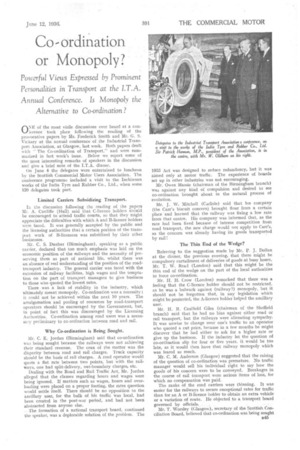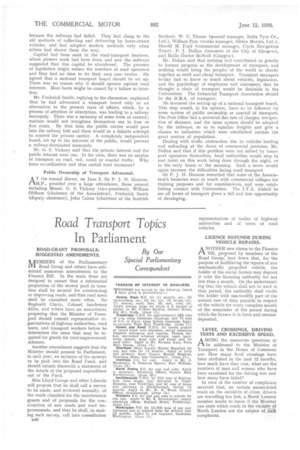Co-ordination
Page 63

Page 64

If you've noticed an error in this article please click here to report it so we can fix it.
or Monopoly?
Powerful Views Expressed by Prominent Personalities in Transport at the I.T.A. Annual Conference. Is Monopoly the Alternative to Co-ordination?
ONE of the most virile discussions ever heard at a conference took place following the reading of the provocative papers. by Mr. Frederick Smith and Mr. G. S. Vickary at the annual conference of the Industrial Transport Association, at Glasgow, last week. Both papers dealt with " The Co-ordination of Transport," and were summarized in last week's issue. Below we report some of the most interesting remarks of speakers in the discussion and give a brief note of the I.T.A. dinner.
On June 4 the delegates were entertained to luncheon by the Scottish Commercial Motor Users Association. The conference programme included a visit to the Inchinnan works of the India Tyre and Rubber Co., Ltd., NO-len some 120 delegates took part.
Limited Carriers Subsidizing Transport.
In the discussion following the reading of the papers Mr. A. Cunliffe (Hull) said that C-licence holders should be encouraged to attend traffic courts, so that they might appreciate the difficulties with which A and B-licence holders were faced. It was generally accepted by the public and the licensing authorities that a certain portion of the transport work of B-licensees was subsidized by their other businesses.
Mr. C. S. Dunbar (Birmingham), speaking as a public carrier, declared that too much emphasis was laid on the economic position of the railways and the necessity of preserving them as part of national life, whilst there was an absence of real understanding of the position of the roadtransport industry. The general carrier was faced with the extension of railway facilities, high wages and the temptation on the part of transport managers to give business to those who quoted the lowest rates. • There was a lack of stability in the industry, which ultimately meant monopoly. Co-ordination was a necessity ; it could not be achieved within the next 10 years. The amalgamation and pooling of resources by road-transport operators should be encouraged by the Government, hut, in point of fact this was discouraged by the Licensing Authorities. Co-ordination among road users was a necessary preliminary to co-ordination between road and rail.
Why Co-ordination is Being Sought.
Mr. C. E. Jordan (Birmingham) said that co-ordination was being sought because the railways were not achieving their standard revenue. The crux of the matter was the disparity between road and rail charges. Truck capacity should be the basis of rail charges. A road operator would quote a fiat rate between two points, but with the railways, one had split-delivery, out-boundary charges, etc.
Dealing with the Road and Rail Traffic Act, Mr. Jordan alleged that the clauses regarding hours and wages were being ignored. If matters such as wages, hours and overloading were placed on a proper footing, the rates question would settle itself. There should be no opposition to the ancillary user, for the bulk of his traffic was local, had been created in the post-war period, and had not been abstracted from anyone else.
The formation of a national transport board, continued the speaker, was a deplorable solution of the problem. The 193,3 Act was designed to reduce redundancy, but it was aimed only at motor traffic. The experience of boards set up in other industries was not encouraging. Mr. Owen Massie (chairman of the Birmingham branCh) was against any kind of compulsion and desired to see co-ordination brought about in the natural process of evolution.
Mr. J. W. Mitchell (Carlisle) said that his company (the Carr's biscuit concern) brought flour from a certain place and learned that the railway was fixing a low rate from that centre. His company was informed that, as the rate had been fixed because of intense competition from road transport, the new charge would not apply to Carr's, as the concern was already having its goods transported by rail The Thin End of the Wedge?
Referring to the suggestion made by Mr. J. Dollan
at the dinner, the previous evening, that there might be compulsory curtailment of deliveries of goods at busy hours, Mr. T. W. Read (London) said that this might be the thin end of the wedge on the part of the local authorities to force co-ordination.
Mr. H. H. Crow (London) remarked that there was a feeling that the C-licence holder should not be restricted, as he was a bulwark against (railway?) monopoly, but it should not be forgotten that, in any legislation which might be promoted, the A-licence holder helped the ancillary user.
Mr. H. R. Caulfield Giles (chairman of the Sheffield branch) said that he had no bias against either road or rail transport, but the railways were alienating sympathy. It was unwise to change over one's traffic to an operator who quoted a cut price, because in a few months be might discover that he had either to ask for a higher rate or give up the business. If the industry let the question of co-ordination slip for four or five years. it would be too late, as it would then have that railway monopoly which was feared so much.
Mr. C. M. Anderson (Glasgow) suggested that the raising of the question of co-ordination was premature. No traffic manager would sell his individual right to say how the goods of his concern were to be conveyed. Breakages in the course of rail transport were serious items of loss, for which no compensation was paid.
The ranks of the road carriers were thinning. It was easier for the railways to secure exceptional rates for traffic than for an A or. B-licence holder to obtain an extra vehicle or a variation of route. He objected to a. transport board governed by officials. .
Mr. T. Worsley (Glasgow), secretary of the Scottish Conciliation Board., believed that co-ordination was being sought B45 because the railways had failed. They had clung to the old methods of collecting and delivering by horse-drawn vehicles, and had adopted modern methods only when others had shown them the way.
• Capital had been sunk in• the road-transport business, where pioneer work had been done, and now the railways suggested that this capital be abandoned. The pressure of legislation might reduce the numbers of road operators and they had no time to let their own case evolve. He agreed that a national transport board should be set up. There was no reason why it should operate against road interests. More harm might be caused by a failure to interfere.
Mr. Frederick Smith, replying to the discussion, explained that he had advocated a transport board only as an alternative to the present state of affairs, which, by a process of attrition or absorption, was leading to a railway monopoly. There was a necessity of some form of control; matters would not straighten themselves out in four or five years. By that time the public carrier would pass into the railway fold and there would be a definite attempt to control the private carrier. A completely independent board, set up in the interests of the public, would prevent a railway-dominated monopoly.
Mr. G. S. Vickary said that tho private interest and the public interest were one. In his view, there was no surplus of transport on road, rail, canal or coastal traffic. Why force co-ordination and thus curtail road transport?
Public Ownership of Transport Advocated.
AT the annual dinner, on June 2, Sir P. J. H. Hannon, M.P., presided over a large attendance, those present including Messrs. G. S. Vickary (vice-president), William Oldham (chairman of the Association), Frederick Smith (deputy chairman), John Cairns (chairman of the Scottish Section), W. C. Thorne (general manager, India Tyre Co., Ltd.), William Pate (works manager, Albion Motors, Ltd.), Harold M. Ford (commercial manager, Clyde Navigation Trust), P. J. Dollan (treasurer of the City of Glasgow), and Bailie Hector McNeill (Glasgow).
Mr. Dollan said that nothing had contributed so greatly to human progress as the development of transport, and nothing would bring the peoples of the world so closely together as swift and cheap transport. Transport managers to-day had to know so much about vehicles, legislation, and the psychology of employees and customers, that he thought a chair of transport would be desirable in the Universities. The Industrial Transport Association should be the B.M.A. of transport.
He favoured the setting up of a national transport board. This step would, in his opinion, have to be followed by some system of public ownership or control of transport. The Post Office had a universal flat rate of charges, irrespective of distance, and the same system should be adopted by the railways, so as to equalize freights and give a chance to industries which were established outside the great centres of population.
Dealing with traffic obstruction due to vehicles loading and unloading at the doors of commercial premises, Mr. Dollan said that if this problem were not solved by transport operators themselves, local authorities would step in and insist on this work being done through the night, or in the early hours of the morning. Such a move would again increase the difficulties facing road, transport.
Sir P. J. H. Hannon remarked that some of the Association's branches were in touch with commercial colleges for training purposes and for examinations, and were establishing contact with Universities. The I.T.A. wished to see all forms of transport given a full and free opportunity of developing.




































































































